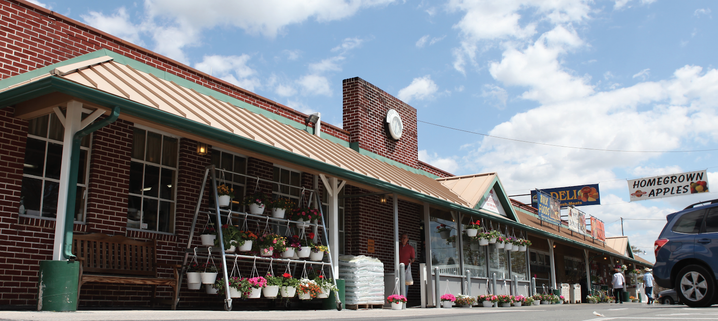Posted by Jeff Pauls on 4th Jun 2019
Legacy
Recently, I heard the word, “legacy,” used to refer to our business. It was during a conversation about our goals for 2019. The person who used the term was referring to the many years Kauffman’s has been in business and how businesses that are our age have built a legacy. They were implying that the hard work that it took to build up such businesses is commendable. The many hands and the many years have made the business what it is today. It was also a reminder that in order to maintain such a legacy the same attitude and dedication that built the business must be applied to continue the legacy that exists today.
It is with this frame of mind that we move forward, making plans for this year and the coming years. As we look to the future, we have a strong foundation on which to build. Faith, Family, & Fruit – The Core Of Our Business, features two key building blocks of this foundation-- good-will and perseverance. Cultivating these virtues is essential to a strong future for Kauffman’s Fruit Farm & Market. Below, are two excerpts that highlight the good-will and perseverance that are part of the attitude we strive to maintain today.
Tough times could have been the end of A.L’s dream, but the good-will of others and his cooperative spirit enabled the business to thrive...
Surviving Hard Times
Planting trees and working hard were no guarantees that an orchard would thrive as a successful business. A.L. definitely encountered ups and downs in getting his fruit enterprise off the ground. In his early years he needed a boost to keep going.
According to family legend, A.L.’s friend Isaac Fisher of Soudersburg was his financial adviser. Isaac had amassed considerable wealth with several farms, a thrashing rig, and road work equipment. He had money to lend and made a loan to A.L. when he observed that A.L. was struggling. The terms included no interest and no deadline for repayment.
After a while, Isaac realized that still more money was needed for his friend’s orchard business to survive. On his own he approached A.L.
with an offer of more money at no interest. It was enough to keep A.L.’s fledgling business afloat and eventually the debt was repaid in full.
But A.L.’s troubles were not over yet. An article in the Bird-in-Hand 250th Anniversary Book describes his predicament: Just when the
fruit business was well on its way…the Great Depression of the 1930s hit Lancaster County. Apples, which were piled in the tobacco cellar,
rotted because no one could buy them. They had to be practically given away.
A.L. was so discouraged that he felt like tearing out all of his fruit trees. But instead, he turned to the First National Bank of Intercourse for
financial backing. In the middle of rather desperate circumstances, A.L. relied on the good faith of Banker Harry B. Showalter who had
confidence in his ability to repay a major loan, which he did within a year.
The generosity of a friend and the trust of a banker helped A.L. prove to the community that an apple and peach orchard could flourish and
Prosper. (from p. 13 of the book)
A.L. Kauffman did not take this generosity for granted. He built on it, demonstrating his perseverance by using his creative tenacity to convert this generosity into a solid, local business…
Tending a Growing Operation
From the time his trees began producing in 1915, A.L. sold his fruit from the family farm, storing the extras in the tobacco cellar to sell later. By 1935
economic times following the Great Depression had improved to the point where A.L. realized that he needed an outlet on Old Philadelphia Pike. There his fruit would be visible to passersby. He opened a roadside stand on a second farm that he had bought at 3102 Old Philadelphia Pike.
In the 20s, 30s, and 40s, A.L. concentrated on purchasing more land to expand his orchards. While many Lancaster County farmers were buying additional farms for their sons, A.L. was buying additional farms for more fruit trees. He was able to buy three nearby farms, one in each decade, until he owned 135 acres. Although his main crops were apples and peaches, throughout the years he also raised pears, plums, cherries, and grapes.
Some acres of the original Kauffman Homestead were still devoted to general farming, such as growing field crops and raising steers, hogs, and
chickens. During busy seasons on the farm, orchard workers helped with the harrowing, haymaking, and corn cutting.
In 1937 A.L. enabled his business to take a great step forward when he decided to build a large packinghouse along the Old Philadelphia Pike. This facility would provide space to process and pack fruit for wholesale and retail. This was quite a significant undertaking since the packinghouse was located along a small country road, somewhat out in the middle of nowhere. There were few other buildings in the area as extensive as the one he planned to build. Local people were amazed at that much space all under one roof. (from p. 14 of the book)
Even today, evidence of this perseverance and good-will is still strong. Cooperation, vision, and tenacity continue to define and inform everything that Kauffman’s Fruit Farm & Market work toward. We give thanks to God for everything He’s given us and count it a privilege to work, live, and serve here in this community.
I’ll leave you with three of A.L.’s guiding principles that are largely responsible for the legacy he left:
1) Be fair and generous to the customers. The customer is always right. Do not argue with him.
2) Be kind, considerate, and fair to employees.
3) Be visionary. Take some chances in business even though it means risking losses.
(from p. 22 of the book)

